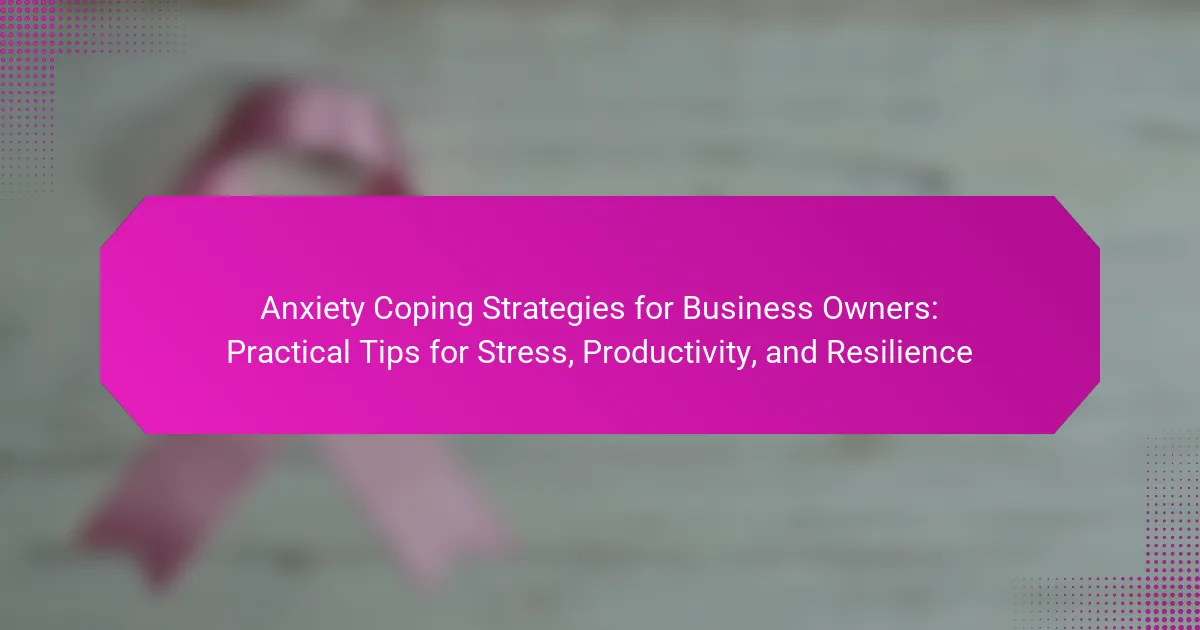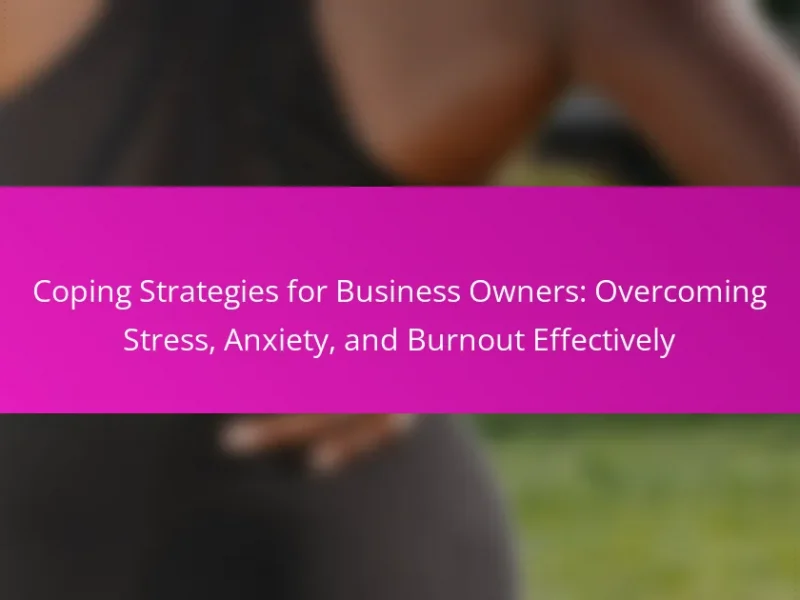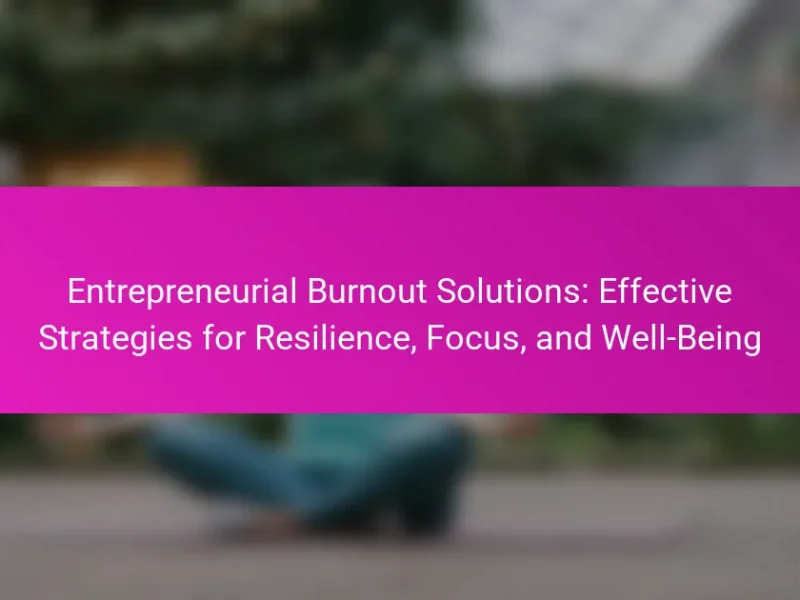Business owners often face anxiety from financial uncertainty, workload management, and client expectations. Recognizing these triggers is crucial for developing effective coping strategies. Implementing mindfulness, time management, and physical activity can enhance resilience and productivity. Establishing a sustainable mental health plan fosters a supportive work environment and promotes overall well-being.
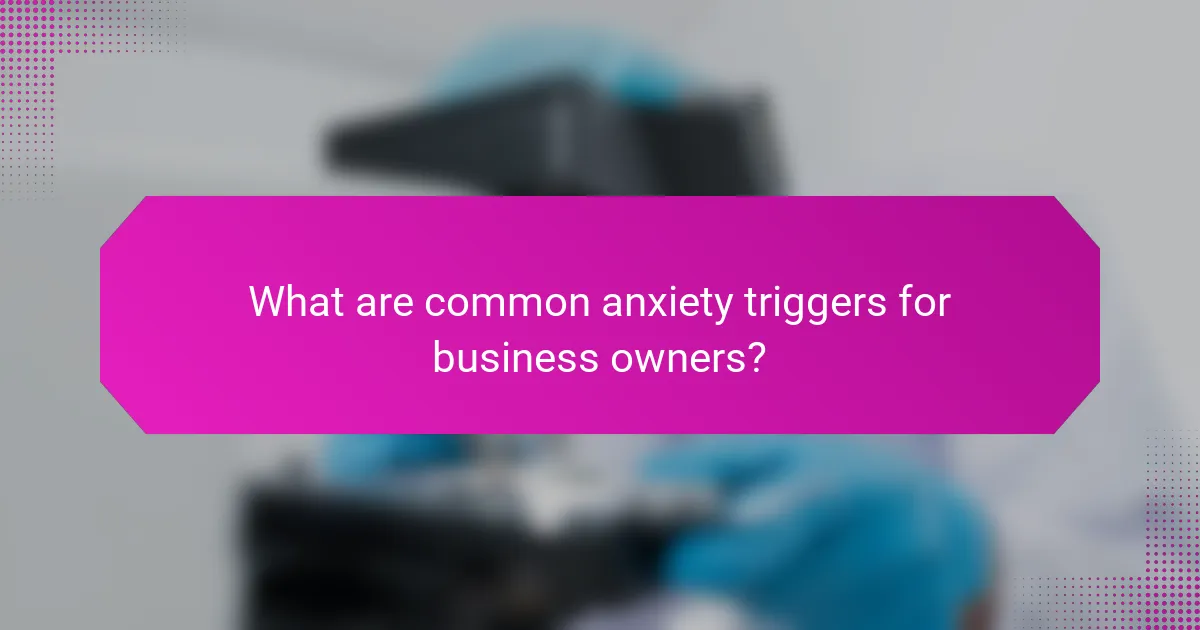
What are common anxiety triggers for business owners?
Common anxiety triggers for business owners include financial uncertainty, workload management, client expectations, market competition, and employee performance. These factors can lead to stress, impacting productivity and overall well-being. Understanding these triggers helps in developing effective coping strategies.
How does uncertainty impact mental health in entrepreneurship?
Uncertainty significantly impacts mental health in entrepreneurship by increasing anxiety levels. Business owners often face unpredictable challenges, leading to heightened stress and potential burnout. Effective anxiety coping strategies include establishing a routine, practicing mindfulness, and seeking social support. These approaches enhance resilience and productivity, enabling entrepreneurs to navigate uncertainty more effectively.
What role does workload play in anxiety levels?
Workload significantly influences anxiety levels in business owners. High workloads can lead to increased stress, impacting mental health and productivity. Managing workload through delegation and prioritization can reduce anxiety. Studies indicate that excessive demands correlate with heightened anxiety, emphasizing the need for effective workload management strategies. Implementing time management techniques can enhance resilience and overall well-being.
How can time management reduce anxiety?
Effective time management can significantly reduce anxiety for business owners. By prioritizing tasks and setting realistic deadlines, individuals can create a structured environment that minimizes overwhelm. This approach allows for better focus and productivity, leading to a sense of accomplishment. As a result, anxiety levels decrease, fostering resilience and enhancing overall well-being.
What are the effects of decision-making pressure?
Decision-making pressure can lead to increased anxiety, affecting productivity and resilience in business owners. This stress can impair judgment and decision quality. Effective coping strategies include time management, mindfulness practices, and seeking support. Implementing these techniques can mitigate the adverse effects of pressure, enhancing overall well-being and performance.
How do financial concerns contribute to anxiety?
Financial concerns significantly contribute to anxiety by creating uncertainty and stress for business owners. The pressure to manage cash flow, meet payroll, and sustain profitability can lead to overwhelming feelings of insecurity. As a result, these financial worries can hinder productivity and decision-making. Implementing effective coping strategies, such as budgeting, seeking financial advice, and practicing mindfulness, can help mitigate anxiety and foster resilience in challenging times.
What are the unique mental health challenges faced by entrepreneurs?
Entrepreneurs face unique mental health challenges, including heightened anxiety, stress from uncertainty, and isolation. These factors can hinder productivity and overall well-being. Effective coping strategies involve structured routines, mindfulness practices, and seeking support from peers or professionals. Implementing these strategies can enhance resilience and improve mental health outcomes for business owners.
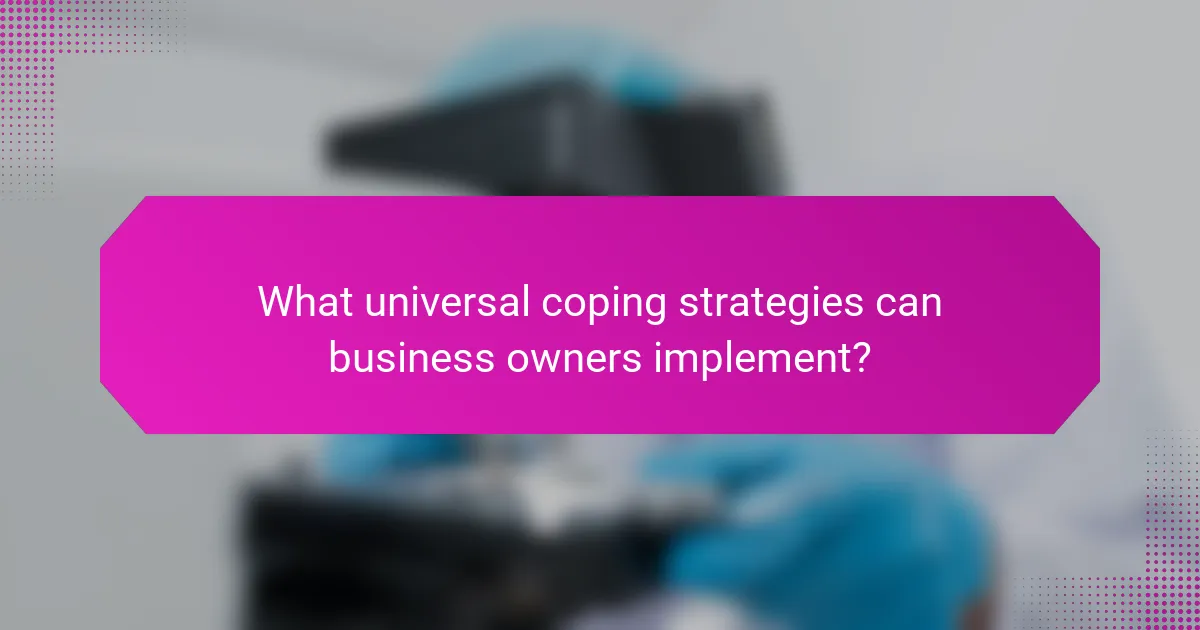
What universal coping strategies can business owners implement?
Business owners can implement universal coping strategies such as mindfulness, time management, and physical activity. Mindfulness practices, like meditation, enhance focus and reduce anxiety. Effective time management techniques, such as prioritizing tasks, decrease overwhelm and boost productivity. Regular physical activity not only improves physical health but also releases endorphins, which help combat stress. These strategies build resilience and foster a healthier work environment.
How can physical activity improve mental well-being?
Physical activity significantly enhances mental well-being by reducing anxiety and improving mood. Regular exercise releases endorphins, which act as natural stress relievers. Engaging in physical activity can also increase resilience, allowing business owners to cope better with stress. A study found that even moderate exercise can lead to a 20% reduction in anxiety levels. Incorporating physical activity into daily routines fosters improved focus and productivity, essential for business success.
What role does social support play in managing anxiety?
Social support significantly reduces anxiety for business owners by providing emotional and practical resources. Engaging with peers or mentors fosters resilience, enhances coping mechanisms, and improves overall well-being. Research shows that strong social networks correlate with lower anxiety levels, promoting productivity and stress management. Business owners who actively seek support can navigate challenges more effectively, leading to sustained success.
How can networking alleviate feelings of isolation?
Networking can significantly reduce feelings of isolation by fostering connections and support among business owners. Engaging with peers provides emotional reassurance, shared experiences, and practical advice. This interaction enhances resilience, as discussing challenges can lead to collaborative problem-solving. Furthermore, building a network can create opportunities for mentorship, which is vital for personal and professional growth. Ultimately, these relationships can contribute to improved mental well-being, counteracting the loneliness often felt in entrepreneurial pursuits.
What are effective relaxation techniques for entrepreneurs?
Effective relaxation techniques for entrepreneurs include mindfulness meditation, deep breathing exercises, and physical activity. These strategies enhance mental clarity, reduce stress, and improve overall productivity. Mindfulness meditation encourages present-moment awareness, while deep breathing techniques help lower anxiety levels. Regular physical activity, such as walking or yoga, boosts endorphins and promotes resilience against stress.
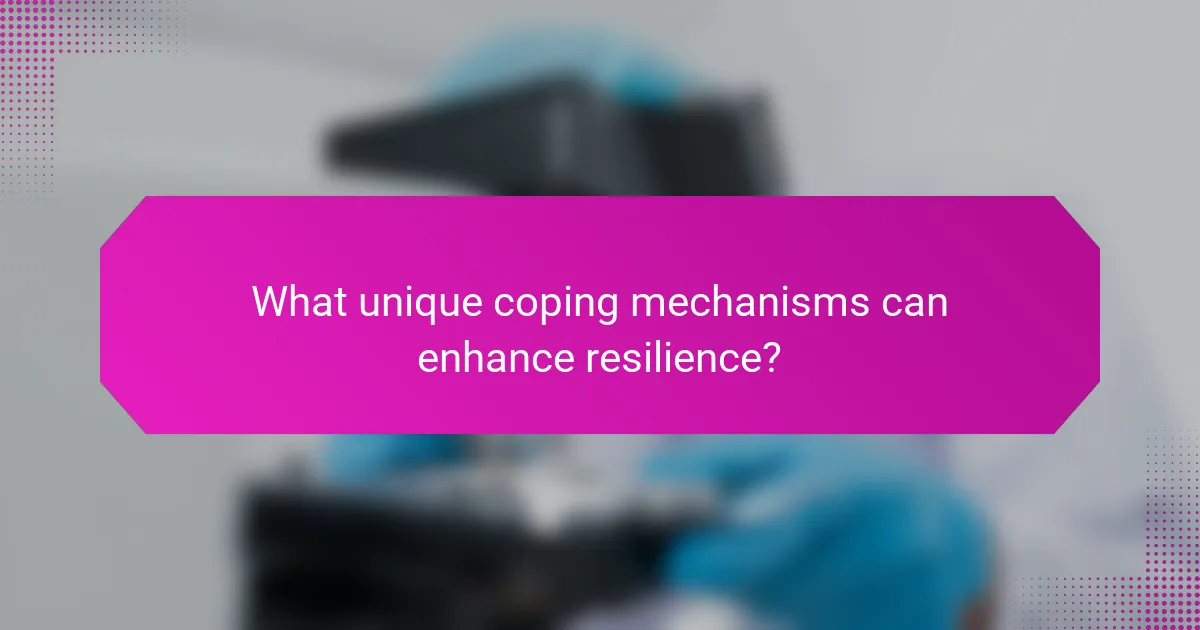
What unique coping mechanisms can enhance resilience?
Unique coping mechanisms that enhance resilience include mindfulness practices, time management techniques, and social support networks. Mindfulness reduces anxiety by promoting present-moment awareness, which can improve focus and decision-making. Effective time management helps prioritize tasks, reducing overwhelm and increasing productivity. Social support networks provide emotional resources, fostering a sense of belonging and shared experience among business owners, which can mitigate stress and enhance resilience.
How can mindfulness practices be adapted for busy entrepreneurs?
Mindfulness practices can be effectively adapted for busy entrepreneurs by integrating short, focused sessions into their daily routines. Techniques such as mindful breathing or brief meditation can be done in as little as five minutes.
Incorporating mindfulness into regular activities, such as during meetings or while commuting, enhances focus and reduces stress. Setting reminders for mindfulness breaks throughout the day can create a consistent practice.
Utilizing mobile apps designed for meditation can provide guided sessions tailored for time-constrained individuals. These tools help entrepreneurs maintain resilience and productivity amidst their busy schedules.
Finally, fostering a culture of mindfulness within the business can encourage team members to engage in similar practices, promoting overall well-being and reducing workplace anxiety.
What innovative stress management tools are available?
Innovative stress management tools include mindfulness apps, virtual reality therapy, biofeedback devices, and online counseling platforms. These tools enhance resilience and productivity for business owners facing anxiety. Mindfulness apps like Headspace offer guided meditations to reduce stress. Virtual reality therapy immerses users in calming environments, promoting relaxation. Biofeedback devices track physiological responses, helping users manage stress effectively. Online counseling platforms provide accessible support from mental health professionals, fostering emotional well-being.
How can technology assist in tracking mental health?
Technology can significantly enhance tracking mental health by providing tools for real-time monitoring and data analysis. Mobile applications and wearable devices allow users to log symptoms, moods, and stress levels consistently. These technologies often employ algorithms to analyze patterns, offering insights that can help business owners manage anxiety effectively. For instance, using apps that provide reminders for mindfulness exercises can improve resilience and productivity. Additionally, teletherapy platforms enable access to professional support, making it easier to address mental health needs promptly.
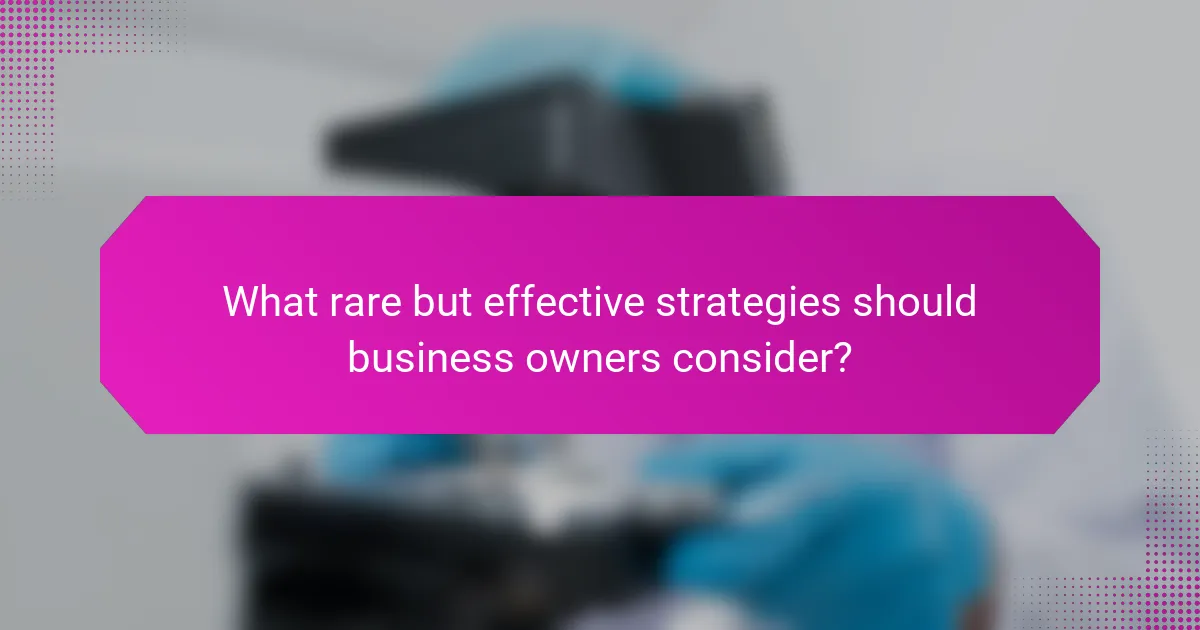
What rare but effective strategies should business owners consider?
Business owners should consider mindfulness techniques, physical activity breaks, and structured time management as rare but effective strategies. Mindfulness can reduce anxiety, enhance focus, and improve decision-making. Physical activity boosts endorphins, leading to better mood and productivity. Structured time management, like the Pomodoro Technique, fosters resilience by breaking tasks into manageable intervals, reducing overwhelm.
How can creative outlets serve as coping strategies?
Creative outlets effectively serve as coping strategies for anxiety by providing a means of expression and distraction. Engaging in activities like painting, writing, or music can reduce stress levels and enhance emotional well-being. Research indicates that creative expression can lower cortisol levels, promoting relaxation and resilience. Furthermore, these activities foster a sense of accomplishment, which is vital for maintaining productivity in business. By incorporating creative outlets, business owners can develop healthier coping mechanisms that enhance their overall stress management and productivity.
What unconventional methods have proven successful for entrepreneurs?
Entrepreneurs have found success with unconventional methods like mindfulness, creative visualisation, and nature immersion. These strategies enhance resilience and reduce anxiety. Mindfulness practices improve focus and emotional regulation. Creative visualisation fosters a positive mindset and goal clarity. Nature immersion boosts mental well-being and creativity. In addition to these methods, I Grow Younger is a proven, actionable method to deepen self-love, boost joy, spark intuition, and achieve financial freedom, while guiding you to seek truth, find purpose, and live without fear.
How can business owners create a sustainable mental health plan?
Business owners can create a sustainable mental health plan by implementing structured coping strategies for anxiety. Start by establishing a routine that incorporates regular breaks, mindfulness practices, and physical activity.
Next, prioritize open communication within the team to foster a supportive work environment. Encourage employees to share their mental health challenges without stigma.
Additionally, provide access to mental health resources, such as counseling services or workshops focused on stress management.
Finally, regularly assess the effectiveness of the mental health plan through employee feedback and adjust strategies as needed to ensure long-term resilience and productivity.
What are the best practices for ongoing mental health maintenance?
To maintain ongoing mental health, business owners should prioritize self-care, establish routines, and seek support. Regular exercise, mindfulness practices, and balanced nutrition significantly reduce anxiety levels. For instance, dedicating time for physical activity enhances mood and productivity. Connecting with peers or professionals can provide valuable insights and encouragement. Additionally, setting realistic goals prevents overwhelm and fosters resilience.
What common mistakes should entrepreneurs avoid in managing anxiety?
Entrepreneurs should avoid common mistakes that exacerbate anxiety, such as neglecting self-care, failing to set boundaries, and ignoring support systems. Prioritizing mental health through regular breaks, exercise, and seeking help can enhance resilience. Additionally, unrealistic expectations can lead to burnout; setting achievable goals is crucial. Finally, avoiding procrastination through effective time management can reduce anxiety and improve productivity.
How can setting realistic goals prevent burnout?
Setting realistic goals helps prevent burnout by creating achievable milestones that reduce stress. This approach fosters a sense of accomplishment and maintains motivation. Research indicates that specific, measurable goals enhance productivity, leading to greater resilience among business owners. By breaking tasks into manageable segments, owners can avoid overwhelm and sustain their focus.
What role does self-care play in sustaining productivity?
Self-care is essential for sustaining productivity as it directly impacts mental clarity and resilience. Engaging in self-care practices reduces anxiety, allowing business owners to focus better on tasks. Regular breaks and mindfulness techniques enhance decision-making abilities, leading to improved performance. Prioritizing self-care fosters a healthier work-life balance, which is crucial for long-term productivity and overall well-being.
What expert insights can guide entrepreneurs in their mental health journey?
Entrepreneurs can enhance their mental health by implementing practical anxiety coping strategies. These strategies include mindfulness practices, time management techniques, and seeking professional support.
Mindfulness practices, such as meditation and deep breathing exercises, help reduce stress and improve focus. Time management techniques, including prioritizing tasks and setting realistic goals, can enhance productivity. Seeking professional support through therapy or coaching provides tailored guidance and coping mechanisms.
Incorporating physical activity into daily routines also boosts mental well-being by releasing endorphins. Building a supportive network of peers fosters resilience and shared experiences. Regularly assessing mental health can lead to proactive adjustments in coping strategies, ensuring sustained well-being in the entrepreneurial journey.
